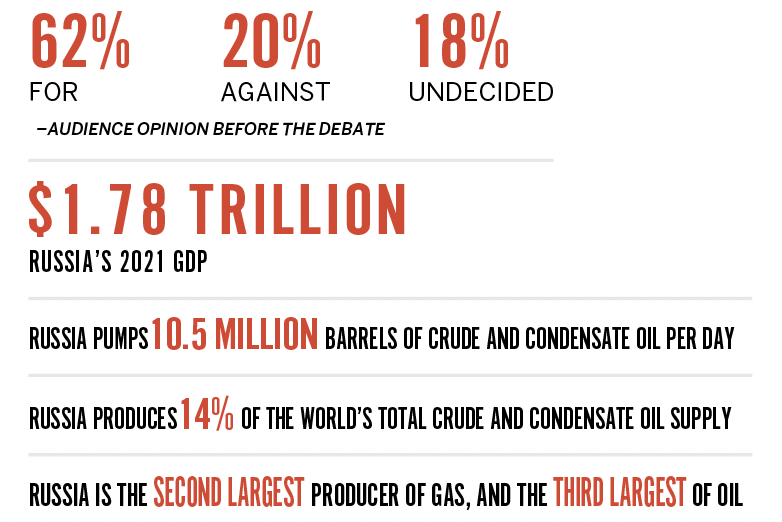Should We Isolate Russia?
Intelligence Squared U.S. invites some of the world’s brightest thinkers to debate issues. The organization was founded in New York in 2006 to promote intellectual diversity by fostering respect for differing opinions.
The debates are organized in the traditional Oxford style. The side that convinces more audience members to embrace its arguments wins.
The excerpts below come from a debate in July about whether or not it’s smart policy to impose sanctions against—or ban energy imports from—Russia.

YES
Michael McFaul, former U.S. ambassador to Russia and author of Cold War to Hot Peace: Isolation is the better strategy to achieve our national and international interests than all the alternatives. Isolation is a strategy to achieve something, as is engagement. It’s important to define what you are seeking to achieve. For the United States of America to achieve its most important objectives vis-a-vis Russia, isolation helps us more than engagement. If you’re going to argue for engagement, there are costs to engaging Mr. Putin today. Are you going to normalize annexation in the name of getting along with Putin? Are you going to forget about human rights and shake the hands of the guy who slaughtered thousands of people in Mariupol? That’s a trade you have to make.
Radan Kanev, member of European Parliament as a representative of the Democratic Bulgaria coalition: I will start with brief history remarks on the issue of integrating or isolating Russia. I do it not because I love history but because Russia’s regimes—and especially Mr. Putin—are strongly preoccupied with history issues, and history is framing their political decisions quite often. The West, for centuries, has had this rather naive, even dangerous, dream of integrating Russia into a rule-based international community. Russia was first integrated as a main player in the so-called concert of powers in the 19th century and then became a permanent member of the U.N. Security Council in the 20th century. Regretfully, in both cases, Russia uses this integration, this position, these new powers, in order to subdue, oppress and even try to erase a big part of Eastern Europe from the map of the world—and rather successfully.
NO
Emma Ashford, senior fellow at the Atlantic Council and author of Foreign Policy’s “It’s Debatable” column: The West shouldn’t isolate Russia. We fully agree and acknowledge that there may be an excellent moral case for doing so, particularly given the barbarity of the Russian invasion of Ukraine. But there are many practical considerations in economic and political space that make it hard to believe that isolating Russia would be an effective approach for the West. Long-term political isolation of Russia and economic isolation are going to bring significant costs here at home for domestic politics in Europe and the United States. We have already seen this as the economic impacts of the Western sanctions are contributing to falling standards of living, adding to inflation, and have produced a backlash against incumbents in elections in France and turmoil in governments in Bulgaria and Estonia.
Jonas Shaende, chief economist of the Fiscal Policy Institute with a focus on economic relations and monetary systems: A series of really adverse economic actions were taken against Russia without giving much thought to the destabilizing, practical impacts of such actions on the global economy. These actions were—we can say now—absolutely unsuccessful in forcing Russia to reverse course in Ukraine. From this standpoint alone, this policy of isolation has been ineffective. In fact, I would say Russia is winning because of this economic isolation. The income from energy doubled for Russia this year. Conversely, elsewhere, we have a situation where everybody is feeling the pinch, particularly in Europe. We have rising inflation, collapsing standards of living, and the industrial base of many European countries is built on cheap energy from Russia. Without the energy, this base is eroding.










